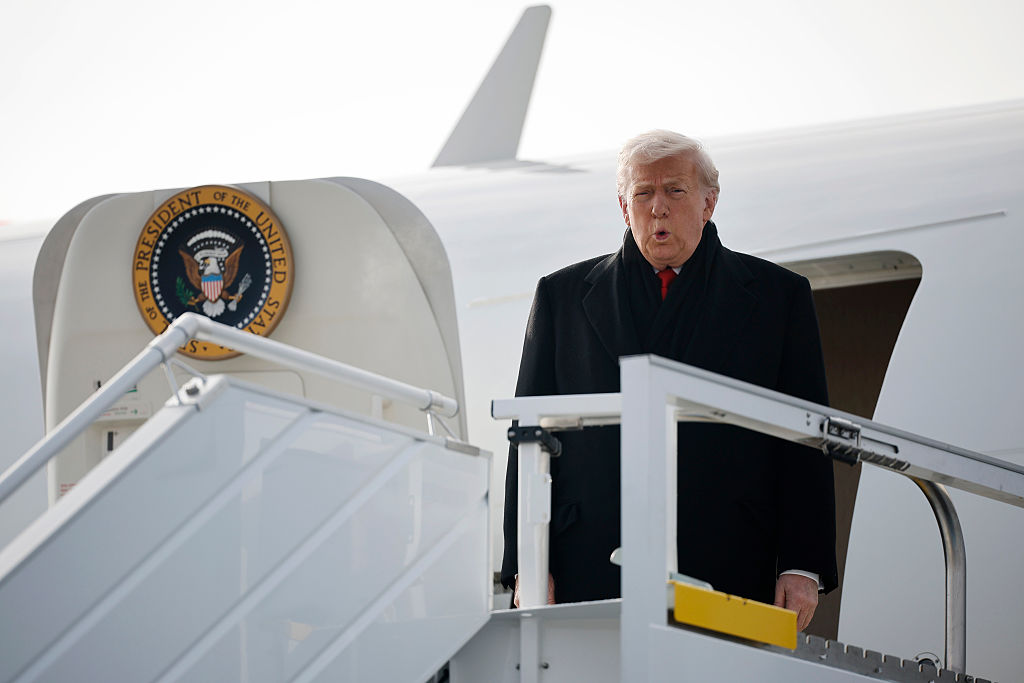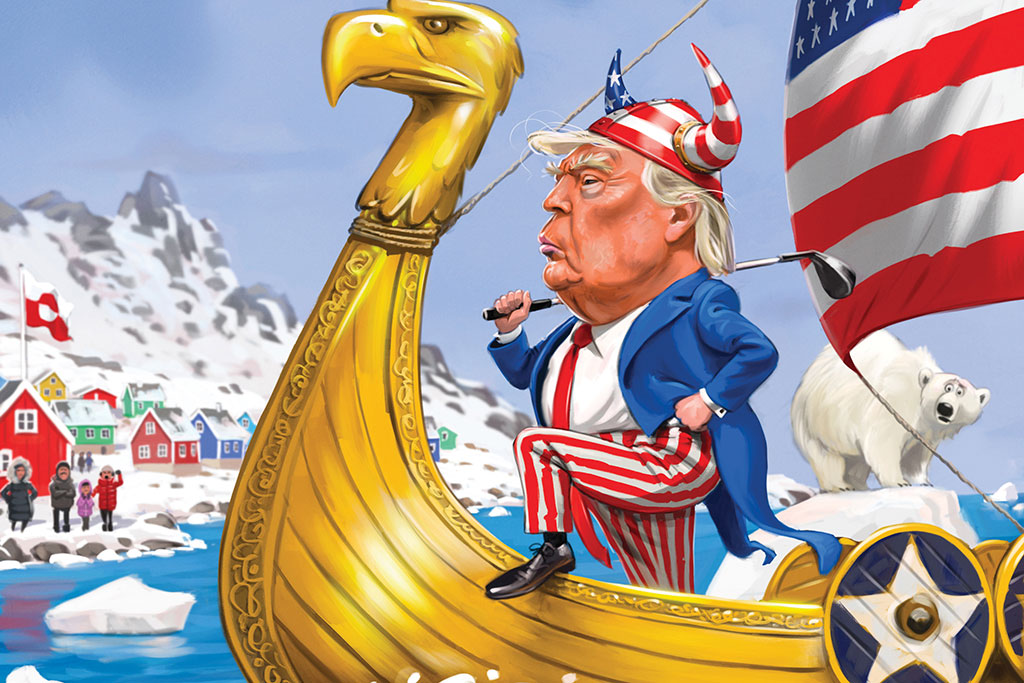Should you sell your US stocks?
The turbulent events of 2025 and early 2026 have dealt a blow to the concept of US exceptionalism, but the US stock market is still going strong


Get the latest financial news, insights and expert analysis from our award-winning MoneyWeek team, to help you understand what really matters when it comes to your finances.
You are now subscribed
Your newsletter sign-up was successful
Want to add more newsletters?
The US has been the centre of the global economy and stock investing for decades, so much so that it has come to seem unassailable.
However, last year saw numerous challenges to the notion of US exceptionalism: a belief that the US is qualitatively distinct and superior to other nations.
A glance at the US stock market’s performance compared to other regions over recent years appears to justify this belief. The S&P 500 outperformed the MSCI World Index (an index that seeks to capture the global stock market) over the last three-, five- and 10-year periods.
MoneyWeek
Subscribe to MoneyWeek today and get your first six magazine issues absolutely FREE

Sign up to Money Morning
Don't miss the latest investment and personal finances news, market analysis, plus money-saving tips with our free twice-daily newsletter
Don't miss the latest investment and personal finances news, market analysis, plus money-saving tips with our free twice-daily newsletter
But in 2025, US stock market dominance was rocked by several events.
The emergence of DeepSeek, for example, sent the S&P 500 down 1.5% in a single session because it struck right at the heart of the idea that US companies had a de facto monopoly over the development of cutting-edge artificial intelligence (AI).
That was followed by market turmoil in April following ‘Liberation Day’ tariffs, as well as fears that the AI bubble could burst, especially during the second half of the year.
It added up to the FTSE 100 outperforming the S&P 500 over the course of 2025 for just the third time in the last decade.
“Momentum has cooled a little as investors weigh up [US president Donald] Trump drama against what should be a strong earnings season,” said Matt Britzman, senior equity analyst at Hargreaves Lansdown, following the S&P 500’s second consecutive weekly decline in the week to 23 January.
The S&P 500 gained just 1% in 2026 through to that date; the FTSE 100 gained double that amount, while the Euro Stoxx 50 gained 2.6%.
Is the age of US stock market dominance over? And where should you invest for 2026 if so?
The US economy is still going strong, but is that good for stocks?
Revised estimates released on 22 January showed the US economy grew faster than expected, at 4.4%, during the third quarter (Q3) of 2025 – its fastest pace of growth since Q3 2023.
According to Hugh Gimber, global market strategist at J.P. Morgan Asset Management, 2026 “should be a reasonable year for the US economy”, with Trump keen to pull whichever levers he can to get the economy and the stock market on a positive footing ahead of midterm elections in November.
However, analysts at Bank of America have questioned whether or not that is good news for the US stock market. A team of analysts led by Savita Subramanian, equity and quant strategist at Bank of America Securities, published a report on 23 January observing that US stocks (counterintuitively) tend to underperform when GDP and earnings per share (EPS) growth are both high.
“Stocks anticipate recoveries, tend to rally most on ‘disaster averted’ scenarios – when expectations are low,” said Subramanian. The bank’s current GDP and EPS forecast are “more consistent with middling equity returns”.
Subramanian also observed that “the index is top-heavy in AI, not GDP-sensitive stocks” and relatively light in the more cyclical companies that would respond positively to strong economic growth.
What does dollar weakness mean for US stocks?
There is a further headwind to US stocks in the form of the weakening US dollar.
American investors will be very happy with the returns their domestic stocks have generated of late, but investors from overseas might have cause for concern.
In the week to 23 January, the returns that different investors would have realised varied by their base currency.
“Dollar-based investors saw gains, but sterling and euro investors registered losses thanks to a near-2% drop in the dollar’s global value,” said John Wyn-Evans, head of market analysis at Rathbones. “That raises the risk of money illusion for US investors, whose rising portfolios may mask declining international purchasing power.”
Wyn-Evans observed that the dollar is threatening to fall below the bottom of its long-term trading range, at the same time as silver and gold prices are surging to new all-time highs.
How to invest for the end of US exceptionalism
If you believe the era of US exceptionalism is over, there are some steps you can take in order to protect your portfolio.
One means of gradually diversifying away from the US would be to feed future investments into a global ex-US tracker instead of a global vanilla fund. By doing so, “an investor would slowly be able to dilute their exposure to America”, said Dan Coatsworth, head of markets at AJ Bell.
Coatsworth highlighted Xtrackers MSCI World Ex-USA ETF (LON:XMWX) as one of the most popular choices of global ex-US funds.
You could also invest in some global markets outside the US that are more overlooked. Coatsworth highlighted “greater appetite for UK, European and Japanese investments” through 2025, with all three regions’ major indices having outperformed the S&P 500 so far in 2026.
Get the latest financial news, insights and expert analysis from our award-winning MoneyWeek team, to help you understand what really matters when it comes to your finances.

Dan is a financial journalist who, prior to joining MoneyWeek, spent five years writing for OPTO, an investment magazine focused on growth and technology stocks, ETFs and thematic investing.
Before becoming a writer, Dan spent six years working in talent acquisition in the tech sector, including for credit scoring start-up ClearScore where he first developed an interest in personal finance.
Dan studied Social Anthropology and Management at Sidney Sussex College and the Judge Business School, Cambridge University. Outside finance, he also enjoys travel writing, and has edited two published travel books.
-
 What the government’s baby boomer retirement data says about the future of pensions
What the government’s baby boomer retirement data says about the future of pensionsA study of the retirement routes of people born in 1958 paints a worrying picture for people’s pension savings
-
 An experienced investor’s end of tax year checklist
An experienced investor’s end of tax year checklistThe clock is ticking down before the end of the 2025/26 tax year, when any tax-free savings and investment allowances are lost. For experienced investors, though, the deadline for some tax-saving schemes is even earlier.
-
 New Federal Reserve chair Kevin Warsh has his work cut out
New Federal Reserve chair Kevin Warsh has his work cut outOpinion Kevin Warsh must make it clear that he, not Trump, is in charge at the Fed. If he doesn't, the US dollar and Treasury bills sell-off will start all over again
-
 How Canada's Mark Carney is taking on Donald Trump
How Canada's Mark Carney is taking on Donald TrumpCanada has been in Donald Trump’s crosshairs ever since he took power and, under PM Mark Carney, is seeking strategies to cope and thrive. How’s he doing?
-
 Why does Trump want Greenland?
Why does Trump want Greenland?The US wants to annex Greenland as it increasingly sees the world in terms of 19th-century Great Power politics and wants to secure crucial national interests
-
 How Javier Milei led an economic revolution in Argentina
How Javier Milei led an economic revolution in ArgentinaFollowing several setbacks, Argentine president Javier Milei's pro-market reforms have been widely endorsed in a national poll. Britain will need the same
-
 Canada will be a winner in this new era of deglobalisation and populism
Canada will be a winner in this new era of deglobalisation and populismGreg Eckel, portfolio manager at Canadian General Investments, selects three Canadian stocks
-
 Circle sets a new gold standard for cryptocurrencies
Circle sets a new gold standard for cryptocurrenciesCryptocurrencies have existed in a kind of financial Wild West. No longer – they are entering the mainstream, and US-listed Circle is ideally placed to benefit
-
 What MoneyWeek has learnt in the last 25 years
What MoneyWeek has learnt in the last 25 yearsFinancial markets have suffered two huge bear markets and a pandemic since MoneyWeek launched. Alex Rankine reviews key trends and lessons from a turbulent time
-
 Investors need to get ready for an age of uncertainty and upheaval
Investors need to get ready for an age of uncertainty and upheavalTectonic geopolitical and economic shifts are underway. Investors need to consider a range of tools when positioning portfolios to accommodate these changes